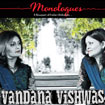Perceptive Travel World Music Reviews
February 2013 - By Laurence Mitchell
In this issue: Persian poetry set to music, Bollywood and Cuba via Toronto, and Mali's almost-best second-best stringed gourd player.
Dawning
Saffron
We say: Persian poetry in a slow-burn fusion setting.
A curious one, this. Poetic recitation with musical accompaniment is something not many of us are familiar with. When it is the Sufi poetry of Maulânâ Jalâl al-Din Muhammed Balkhi, better known in the West as Rumi, it is fair to say that we probably need to have our hands held for a while until it clicks.
The first track "Dawning" begins slowly and cautiously—ripples of piano, plangent soprano sax, yearning sitar. It's a drawn-out and deliberate beginning but, as a musical interpretation of the day's dawning, perhaps it is reasonable to expect a slow build—this one is certainly in no hurry to go anywhere. After a few minutes, the vocal comes in, not sung but dramatically evoked spoken poetry in Persian, that most sensual of languages. This is all well and good but, without knowledge of the words spoken, our ears wander in search of something to grasp onto. Finally the listener's patience is rewarded and as, as tabla drums enter the fray around the ten minute mark, the piece starts to move inexorably forward, pulsing gently.
The intention here, exemplified in the use of instruments like piano and sax, sitar and tabla, is to engage both East and West, to create the sort of unity that is at the heart of Rumi's poetry. And it works. With musicians from both traditions — Shujaat Khan on sitar and Abhiman Kaushal on tabla, both classical Indian musicians, and composer Kevin Hays on piano and occasional Rolling Stones horn-man Tim Ries on saxophones — the resultant sound is a gentle coming together of both worlds. The only member of the ensemble able to understand the Persian lyrics is Iranian-American vocalist Katayoun Gourdarzi and so it is an important exercise in intuition for all concerned, although Gourdarzi admits to sketching out the general mood and content of each of the poems to her collaborators beforehand.
"Dawning" is just the beginning, so to speak. "The Inquisitor," the 16-minute track that follows, demands a similar sort of fortitude from the listener, patience that is amply rewarded if we ignore our 21st-century instinct for instant gratification. The odd thing here is that while three of the first four tracks are in excess of 15 minutes duration, somewhat perversely, the last three tracks — "Overcome," "Trembling," and "Nomad"—all run for around just four minutes each. Slow build, fast decay, you might say, but the truth is that the running order pretty much reflects the same order that the tunes were recorded in, and so Dawning evolves in much in the same way for the listener as it did for the musicians who recorded it.
At Peace
Ballake Sissoko
We say: Beautiful pumpkin plucking from Mali's second finest.
Mali is very much in the news right now—for all the wrong reasons. If the political problems facing this troubled expanse of francophone West African Sahel were not bad enough, Mali also happens be among the world's poorest countries. How remarkable then that Mali has such a rich musical culture? Mali has even been labeled as the birthplace of the blues—a statement that is not entirely hyperbolic. Quite unlike anywhere else in Africa, Mali has such a wealth of top-notch virtuoso performers that it might seem that somehow poverty and brutal conflict have been compensated for by artistic talent and rich musical tradition.
Sissoko plays the kora, the African equivalent of the harp, an odd-looking instrument that looks like a hollowed-out pumpkin with strings attached, which is exactly what it is. Given the instrument's harp-like credentials, it seems difficult for kora players to produce music that is anything short of staggeringly beautiful. Sissoko is no exception. Widely regarded as the world's second best kora player (Toumani Diabaté, the elder statesman whom Sissoko has played and recorded with, is respectfully given number one position), Sissoko's playing here is fluid, melodic and effortlessly rhythmic all at the same time.
Sissoko's last album was Chamber Music with French cellist Vincent Segal, a marvelous work reviewed in Perceptive Travel back in December 2010 [insert link]. Segal is involved once more, along with Aboubacar "Badian" Diabaté on 12-string guitar, Moussa Diabaté on six-string guitar, and Fasséry Diabaté on balafon. It seems a bit pointless picking out individual tracks as At Peace works as a whole, one tune flowing into the next in a timeless sort of way. Nevertheless, there are a few standouts. The kora-guitar duets are particularly outstanding, especially the ten-minute "N'tomikorobougou". On other tracks like "Maimouna," Sissoko plays unaccompanied, which allows us a closer view of his startling ability to improvise and develop a theme. At Peace is marvelous throughout: just put it on quietly in the background and let it sneak its way into your consciousness.
Monologues
Vandana Vishwas
We say: Contemporary Indian ghazals from downtown Toronto.
Who'd have thought it: traditional Indian music from Canada? As a girl in India, Vandana Vishwas had hopes of becoming a Bollywood singer but, despite winning singing competitions and appearing on radio and television in the country of her birth, she ended up an architect. After working in Dubai for years she moved to Toronto and it was here that she restarted her musical career, recording Meera—The Lover about seven years ago. Monologues is Vishwas's second recording and consists entirely of original compositions by her, with lyrics by her multi-instrumentalist husband Vishwas Thoke.
As with most Indian vocal music, this recording has the signature high-pitched glissando to the fore, but Monologues is surprisingly varied and generally user-friendly to those not familiar with the form. As well as traditional Indian music, there are jazz influences at work too, and unexpected instrumentation that includes saxophone on "Des Se Door (Away From Motherland)" and Japanese koto on "Aaye Zubaan Pe (Unspoken Love)". There is even a ghazal (an Indian poetic form that originates from Arabic verse) sung to a backing of overdrive guitar in the case of "Mai Kya Hoon (What Am I?)," the closing track. Some songs like "Yahi Ek Lamha (This One Very Moment)" sound almost like contemporary singer-songwriter material, while others like "Bas Baahon Mein (Obsession)" are a bit more Bollywood in feel. The subtitle of Monologues is "A Bouquet of Indian Melodies…" and this seems a fair assessment of what is on offer here.
Essential Tracks
Lula Lounge
We Say: More Toronto grooves, this one is pure Latin dance fever.
You wait years for world music output from Toronto and then suddenly two CDs come along in the same month. This one pays tribute to the city's vibrant Latin music scene and is an unapologetic collection of 15 favorite tracks from Toronto's most celebrated Latin dance club. There's a bonus too: a portion of this recording's sales profits go to a good cause, Canada's Dancing With Parkinson's charity. So, what's not to like?
Virtually all of the performers here are Cuban or Canadian-Cuban and the 15 tracks explore the broad range of musical genres that the country is famous for—there is little sign of Toronto's famously bleak winter here. Jorge Maza & Tipica Toronto perform "La Molotera" in a style known as Charanga Francesa, the 12-piece Changui Habana come up with the polyrhythmic workout of "Guaguanco," while Lady Son with "Cántame Sonera" conjure a groove that combines Guajiro and Son Montuno. Elsewhere, we have "Cuando Me Toca" by Hilario Durán, a pianist lauded by Cuban keyboard supremo Chucho Valdés as "one of the greatest Cuban pianists of the 20th century." Well, it may be the 21st century now but he is still pretty good.
This is a great collection. Music more for dancing than for listening to, perhaps, but none the worse for that.
Laurence Mitchell is a British travel writer and photographer with a special interest in transition zones, cultural frontiers and forgotten places that are firmly off the beaten track. He is author of the Bradt Travel Guides to Serbia, Belgrade and Kyrgyzstan, Slow Norfolk & Suffolk and a regular contributor to hidden europe magazine. His website can be seen at www.laurencemitchell.com and his blog at eastofelveden.wordpress.com.
See the last round of music reviews from Laurence Mitchell.
- Rolling with the Stones Across America by Chris Epting
- Rescuing Costa Rica's Howling Monkeys by David Lee Drotar
- Culture and Castles in Secret Slovakia by Tim Leffel
- Travel Book Reviews

Buy Dawning online here:
Amazon US
Amazon Canada
Amazon UK

Buy At Peace online here:
Amazon US
Amazon Canada
Amazon UK

Buy Monologues online here:
Amazon US
Amazon Canada
Amazon UK

Buy Essential Tracks online here:
Amazon US
Amazon Canada
Amazon UK

